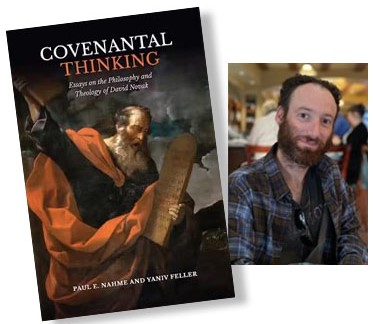 Professor Yaniv Feller, a professor of Judaism and Modern Jewish Thought and Philosophy at the Bud Shorstein Center for Jewish Studies, has published a new book titled Covenantal Thinking: Essays on the Philosophy and Theology of David Novak with the University of Toronto Press.
Professor Yaniv Feller, a professor of Judaism and Modern Jewish Thought and Philosophy at the Bud Shorstein Center for Jewish Studies, has published a new book titled Covenantal Thinking: Essays on the Philosophy and Theology of David Novak with the University of Toronto Press.
The book examines the philosophy and theology of Novak, the prominent Jewish thinker who delves into a plethora of topics ranging from Jewish political thought to Christian theology.
“Edited volumes of essays like this one are of great value because they assemble a collection of scholars to examine a single theme from different perspectives,” said Professor Norman Goda, Director of the Shorstein Center. “And for the editors, they represent a great deal of hard work.”
“David Novak (b. 1941) is one of the leading contemporary Jewish thinkers alive,” said Feller. “Paul Nahme (Brown University) and I both had the good fortune of being his students at the University of Toronto. The questions raised by Novak’s philosophy about ideas such as the elections of Israel and natural law are relevant to thinking about Judaism in the 21st century, interfaith dialogue, and contemporary discussions about the place of religion in the public sphere more broadly.”
Feller and his co-editor Professor Paul Nahme delved into a collection of essays that best describe Novak’s contributions to the field of contemporary Jewish thought. In the collection are also additional critiques of Novak’s thoughts from other authors in the field.
“A unique feature of this volume, which emerged from a conference organized by the Anne Tanenbaum Centre for Jewish Studies at the University of Toronto, is that at the end of each section, David Novak replies to his critics,” said Feller. “This model is not only a testament to Novak’s dialogical character; it is also a rare chance to see philosophical thinking at work, and to have him explain and clarify various aspects of his thought.”
The essay collection seeks to answer a fundamental question of traditional Judaism today, which is “What does it mean to be a part of Western culture and yet separate from many of its secularized forms of life?” The book also grapples with the challenge of Jews maintaining an identity as a “chosen people”, while still “investing in the flourishing of non-Jewish communities.
The book can be ordered at this link.